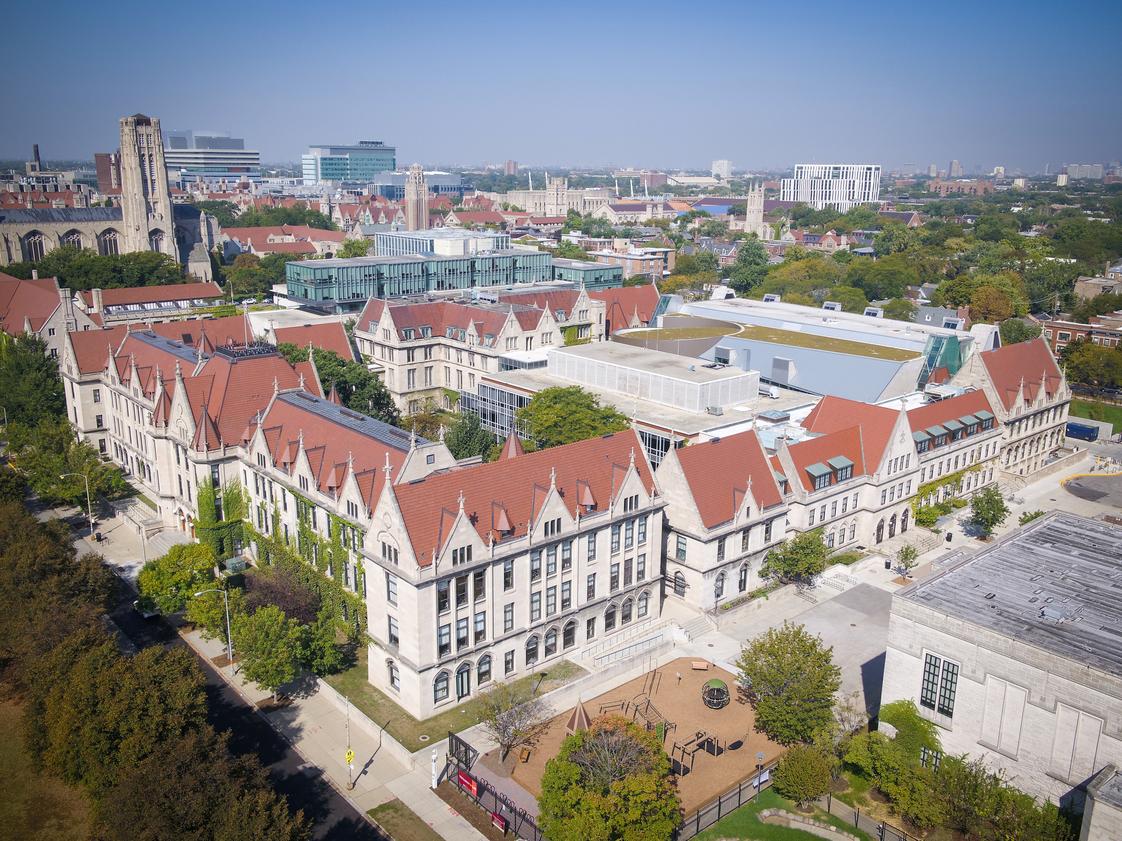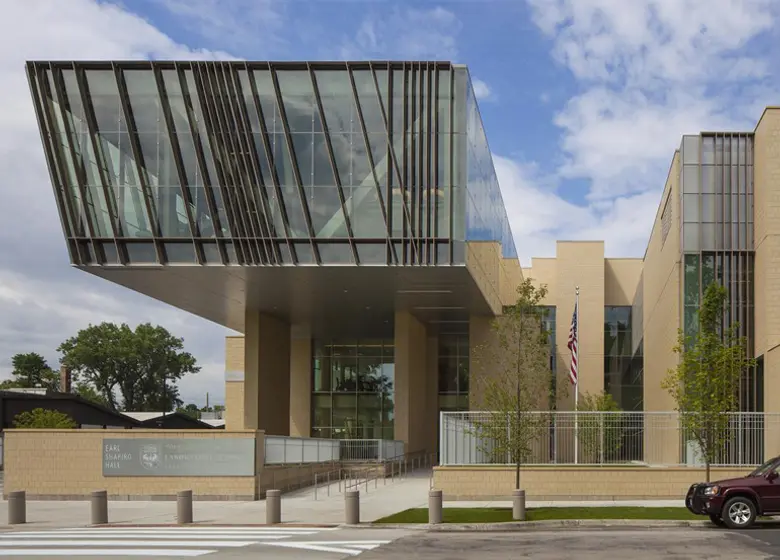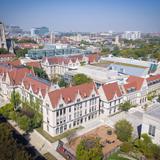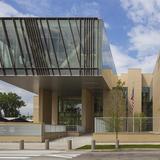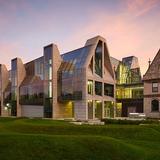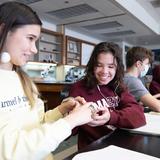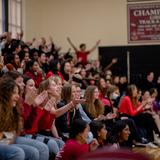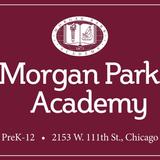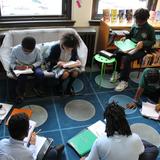The Laboratory Schools are home to the youngest members of the University of Chicago's academic community.
At Lab, we ignite and nurture an enduring spirit of scholarship, curiosity, creativity, and confidence.
Our Schools value learning experientially, exhibiting kindness, and honoring diversity.Lab educates a diverse community of approximately 2,200 students from Nursery through grade 12.
Established in 1896 by renowned philosopher and educator John Dewey, the Laboratory Schools is a pioneer in the progressive education movement and, to this day, continues to provide a best-in-class learning curriculum-more than 125 years later.
Quick Stats (2025)
- Top Ranked IL School
- Grades: Prekindergarten-12
- Enrollment: 2,224 students
- Acceptance rate: 79%
- Application Deadline: Nov. 15
- Source: Verified school update
Top Rankings
University of Chicago Laboratory Schools ranks among the top 20% of private schools in Illinois for:
Category
Attribute
Acceptance Rate
Student Body
School History
School Overview
Religious Affiliation
Grades Offered
Grades Prekindergarten-12
Year Founded
1896
Summer School Offered
Yes
Summer Program Details
School Calendar
Student Body
Total Students
2,224 students
Student Body Type
Co-ed
Students by Grade
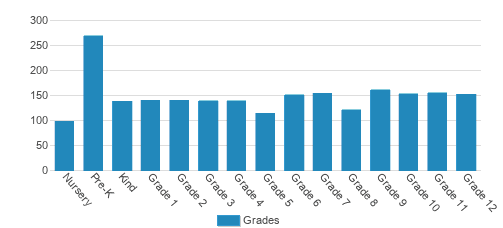
Academics and Faculty
Classroom Dress Code
Casual
Tuition and Acceptance Rate
Admission Deadline
Nov. 15
Tuition Notes
Varies depending on grade level
Acceptance Rate
79%
National avg.: 85%
Admissions Director
Irene M. Reed
Admissions Associate
Manali Barua Grades 3-8
Sports
Total Sports Offered
12 sports
Sports
School Notes
- The University of Chicago Laboratory Schools provide an experience-centered, rigorous and well-rounded education for a diverse community.
- The Laboratory Schools are home to the youngest members of the University of Chicago's academic community. At Lab, we ignite and nurture an enduring spirit of scholarship, curiosity, creativity, and confidence. Our Schools value learning experientially, exhibiting kindness, and honoring diversity.Lab educates a diverse community of approximately 2,200 students from Nursery through grade 12. Established in 1896 by renowned philosopher and educator John Dewey, the Laboratory Schools is a pioneer in the progressive education movement and, to this day, continues to provide a best-in-class learning curriculum-more than 125 years later.
- In addition to a rich history of innovation and excellence, Lab is strengthened by its relationship with the University of Chicago, a world-class university where lifelong learning is modeled for all of its students. About half of Lab students are children of faculty and staff of the University; many of whom are distinguished professors, researchers and authors. As a result, Lab students live and learn in an extended community that places a unique value on intellectual curiosity and creativity; open-mindedness; critical thinking and analysis; and respect for evidence. Located on the University`s campus in the historic Hyde Park community, the Laboratory Schools embrace a deep commitment to diversity-in all of its expressions-equity, and inclusion.Lab is one of the nation`s largest independent schools and boasts a lively, close-knit community where every student is known and cared for as an individual. Students are encouraged to stretch, take risks, and to see education as a lifelong adventure.
- Sample of notable school alumni/alumnae:
- Justice John Paul Stevens' 37 - United States Supreme Court Justice
- Janet Rowley '42 - Geneticist, winner of Presidential Medal of Freedom
- John Rogers, Jr. '76 - Founding chairman and chief executive officer of Ariel Investments
- Andrea Ghez '83 - Astrophysicist, MacArthur Foundation Fellow (2008), Nobel Prize winner (2020)
- Maria Hinojosa '79 - Pulitzer Prize-winning journalist, radio host, producer
- Erwin Chemerinsky '71 - Dean of UC Berkeley School of Law
- Arne Duncan '82 - Former Chicago Public Schools CEO and US Secretary of Education
Source: Verified school update
Frequently Asked Questions
What is the acceptance rate of University of Chicago Laboratory Schools?
The acceptance rate of University of Chicago Laboratory Schools is 79%, which is lower than the national average of 90%. University of Chicago Laboratory Schools's acceptance rate is ranked among the top private schools in Illinois with low acceptance rates.
Who are famous alumni from University of Chicago Laboratory Schools?
University of Chicago Laboratory Schools famous alumni include: Justice John Paul Stevens' 37, Janet Rowley '42, John Rogers, Jr. '76, Andrea Ghez '83, Maria Hinojosa '79, Erwin Chemerinsky '71 and Arne Duncan '82.
Does University of Chicago Laboratory Schools offer a summer program?
Yes, University of Chicago Laboratory Schools offers a summer program. Visit their summer school page for more information.
What sports does University of Chicago Laboratory Schools offer?
University of Chicago Laboratory Schools offers 12 interscholastic sports: Baseball, Basketball, Cross Country, Dance, Diving, Fencing, Golf, Soccer, Swimming, Tennis, Track and Field and Volleyball.
What is University of Chicago Laboratory Schools's ranking?
University of Chicago Laboratory Schools ranks among the top 20% of private schools in Illinois for: Lowest average acceptance rates, Largest student body and Oldest founding date.
When is the application deadline for University of Chicago Laboratory Schools?
The application deadline for University of Chicago Laboratory Schools is Nov. 15.
In what neighborhood is University of Chicago Laboratory Schools located?
University of Chicago Laboratory Schools is located in the Hyde Park neighborhood of Chicago, IL. There are 1 other private schools located in Hyde Park.
School Reviews
Endorse University of Chicago Laboratory Schools. Endorsements should be a few sentences in length. Please include any comments on:
- Quality of academic programs, teachers, and facilities
- Availability of music, art, sports and other extracurricular activities
- Academic or athletic awards
Recent Articles

Hockey Schools
Got an aspiring hockey player in your family? Be sure to check out private high schools. Your daughter or son will find some excellent hockey teams as well as superb sports facilities to match. And, yes, the academics are first-rate too.

A Parent's Guide To Understanding High School Teaching Methods
This comprehensive guide helps parents navigate the various teaching methods used in today's high school classrooms. By understanding these approaches, you'll be better equipped to support your teen's learning journey, communicate effectively with teachers, and create a complementary learning environment at home.

How To Use AI For Research: A High School Student's Guide
We introduce teenagers to AI as a powerful alternative to traditional search engines. This practical guide walks students through using AI tools like Perplexity and ChatGPT for academic research while maintaining intellectual integrity.

